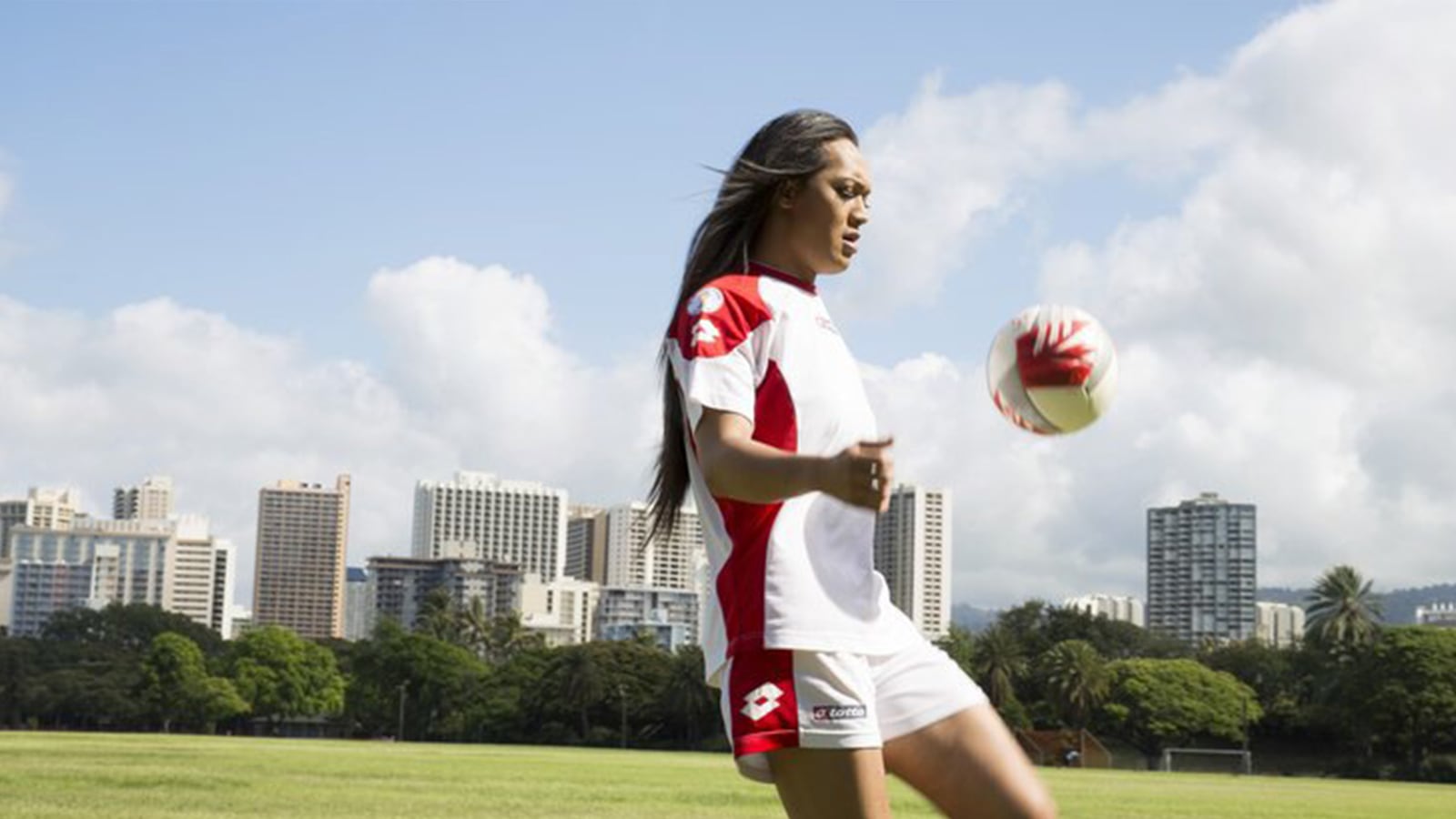Thanks to Caitlyn Jenner appearing on the cover of Vanity Fair and Sepp Blatter resigning from the presidency of FIFA, the first-ever transgender World Cup soccer player is enjoying a doubly sunny few days.
“It’s been a good start to the week,” 27-year-old Jaiyah Saelua said on Tuesday.
Saelua is a star player for the American Samoa men’s team, once called the worst in the world. She was instrumental in its first ever international victory, defeating Tonga in a 2014 World Cup first round qualifying match.
Along with everyone who truly loves the sport, she cheered as Blatter’s announcement brought the promise of something the whole soccer world has desperately needed.
“FIFA cleaning up their act,” she said.

At the same time, Jenner’s appearance on the cover of Vanity Fair seemed a victory for all transgender people.
“It was like it was a new day all over again,” Saelua said of when she first saw the cover. “It gave me hope.”
The rest of the world almost seemed to be catching up with the Samoans, whose culture recognizes a third gender, fa’afafine, “the way of women,” those born male but identifying as female. Saelua posted an open letter in the e-zine SUGA to her fellow Samoans “from a Samoan ‘Caitlyn.’”
“Firstly & most importantly, #CallHerCaitlyn Bruce Jenner is no more,” she wrote. “She has evolved into a human who is living her truth, as should all human beings, transgender or not.”
Saelua had not encountered sexual bigotry herself until she arrived at the University of Hawaii and went to try out for the soccer team. She should have been welcomed as a phenom who had started at age 11 in the only sport offered by her school and who had then made the national team at 14. Nobody back home had worried that she was a fa’afafine. She had demonstrated talent and the essential ingredient to all success.
“Hard work,” she would recall.
But Saelua says the college coach did not even give her a chance to demonstrate her ability and spirit.
“The coach took me aside and pretty much said he didn’t want me on the team,” she remembered. “He said he didn’t want to put the team in an uncomfortable position.”
She added, “It did open my eyes to how cruel the world could be outside the Samoan culture.”
She continued to play with the Samoan team, where the coach treated her only with respect.
“He saw me as an athlete and not as transgender,” she reported on Tuesday. "The respect factor played a huge role in my being comfortable, being able to grow as a player with him as a coach.”
Saelua was now 6-foot-2 and liked playing center back, the last line of defense, where the game can get most physical.
“I like to be challenged, not only as a transgender athlete, but just as an athlete,” she said.
Opponents would sometimes make jokes or remarks aimed at what they imagined was her weak spot.
“They got the opposite reaction,” she recalled. “I use that as motivation.”
She would tackle only harder, turn only fiercer in her determination to defend the goal.
“With my life,” she said.
Then came the 2014 World Cup first round qualifying match. The Samoa team had gone 17 years and 30 games without a win, and had previously been famous for its 31-0 loss to Australia in 2001.
The losing streak now ended with a glorious upset over Tonga. Saelua was credited with an assist as well as a last-minute save in a 2-1 win.
“That was our first ever victory,” she recalled. “To be finally recognized as a winner felt good. It felt really good.”
The team tied in the second round, but lost in the third and failed to qualify. But by then Saelua had learned that soccer made everyone—players and fans—victors over what divides us from each other.
“It unites people from all different places in the world, different backgrounds, the haves and the have-nots, all love the sport,” she said on Tuesday.
That made the kickbacks and bribes at FIFA all the more a disgrace. Hope for better days came with the indictment last week of 14 FIFA officials and associates. Then Sepp Blatter was re-elected president on Friday. It seemed that things might just continue as before.
“FIFA’s corruption has been [going on] for a very long time,” Saelua said.
But the investigation directed by Loretta Lynch—first as U.S. attorney in Brooklyn and now as U.S. attorney general—was pressing ahead. Word came that the feds had traced $10 million in alleged bribe money from South Africa through the highest levels of FIFA.
The FIFA leadership tried to hang the blame on a financial director who had since died. A letter surfaced seeming to implicate the very much alive general secretary, righthand man to Blatter.
On Tuesday, Blatter announced that he would resign. He may yet find himself under indictment, making Lynch the Eliot Ness of soccer, having deposed Blatter just as the Prohibition-era lawman deposed Al Capone.
Whoever becomes FIFA’s next president, Saelua will be on American Samoa’s 2018 World Cup team. She figures training will begin toward the end of June. She plans to stick with the sport in the years ahead.
“Soccer’s pretty much what gave me passage into the world,” Saelua said.
And with this week’s double good news of the Jenner cover and the Blatter resignation, the world promises to be more worthy of having her.






